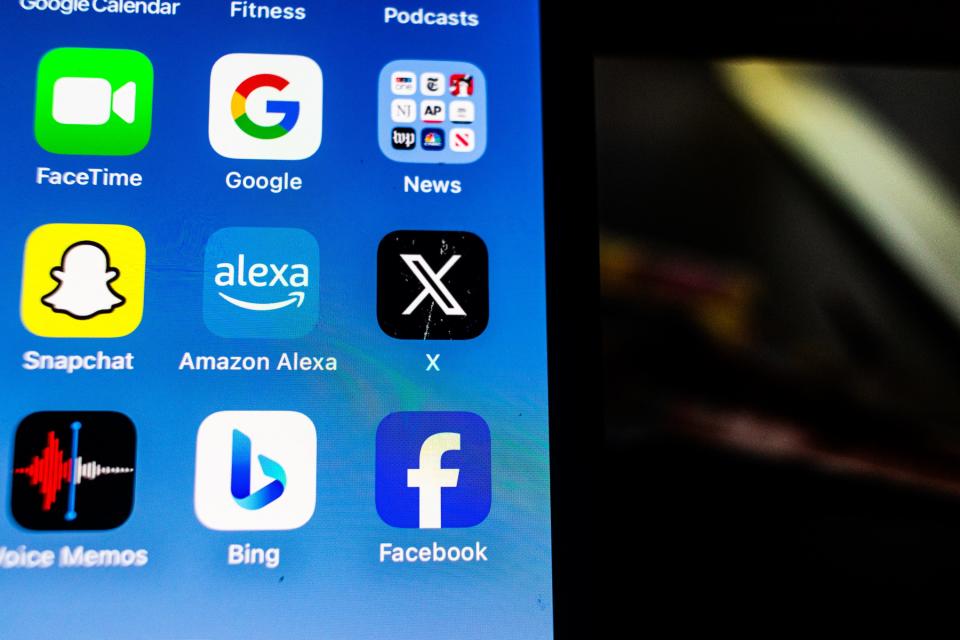Mark Lane: A tale of two social media crackdowns
- Oops!Something went wrong.Please try again later.
A bill banning kids younger than 16 from social media sites passed the Florida Legislature, and a few days later, the U.S. Supreme Court was hearing oral arguments about the Legislature’s past attempt to regulate social media. Both face uncertain futures. Both have serious First Amendment problems.
Judging from their lines of questioning ― always a risky exercise ― Supreme Court justices see problems with the law passed by the Florida Legislature during its 2021 War on Woke/DeSantis-for-President Legislative Session.
And this session, the Legislature pushed out another social media measure. One that put Gov. Ron DeSantis into a bind. On the one hand, the governor loves attacking social media; on the other, he likes to preach about parental rights, something the legislation would preempt.

He also said he had constitutional qualms about the measure. A surprising development since the governor has enthusiastically supported all kinds of unconstitutional measures now being batted around by the courts.
He was especially supportive of the 2021 social media law now before the Supreme Court. He said it would hold the “unaccountable oligarchs” of tech accountable. The governor pushed for the law in reaction to Twitter’s ban on former President Donald Trump in the wake of the Jan. 6 assault on the Capitol. (Twitter, now called X, has since lifted the ban, and Trump started his own site.)
More: Mark Lane: U.S. Supreme Court takes up DeSantis’ attack on social media sites
More: Florida makes argument in pivotal Supreme Court case, could forever change social media
That law mandates that social media sites must carry the postings of anyone who runs for office in Florida or face heavy fines: $250,000 per day for a statewide office and $25,000 per day for other offices.
So if a Nazi runs for, say, the East Flagler County Mosquito Control District, all the nation’s social media websites would be legally obligated to run whatever that person pushes out. It’s not hard to anticipate some problems here.
The lower court in Tallahassee found that “the legislation compels providers to host speech that violates their standards — speech they otherwise would not host — and forbids providers from speaking as they otherwise would. The governor’s signing statement and numerous legislators’ remarks show rather clearly that the legislation is viewpoint-based.”
Judging from the Supreme Court oral arguments, justices also had problems with how the law squared with a past Florida case involving the state’s old Right-to-Reply Law. That law, invalidated in 1974, mandated that newspapers run rebuttals from candidates if they objected to something that appeared in print.
The Right-to-Reply Law was a clear case of the government appointing itself as everybody’s editor for the benefit of politicians. The current social media law does the same for the new media age.
If the earlier social media law gave the state the power to be social media’s content moderator, the new measure made Florida into social media’s stern parent.
That bill would require social media to kick users younger than 16 off their sites and prevent those same users from signing up to use the sites. It would apply to apps and sites like Facebook, Instagram, Snapchat and TikTok, although legislators supporting the measure were careful not to say those names out loud in debate for legal reasons.
I do not know how enforceable this would prove in practice. If watching dance videos on TikTok is outlawed, only outlaws will watch dance videos on TikTok.
This year’s social media bill was a particular goal of House Speaker Paul Renner, R-Palm Coast, and carried the HB 1 designation to emphasize that. Its prominence in the session signaled that the culture wars are far from over in Tallahassee. Which made DeSantis’ lack of enthusiasm for the measure surprising.
But one social media crackdown at a time. For now, it looks like the Supreme Court justices have taken notice of the earlier law’s flaws, and it would be a First Amendment victory if their ruling strikes it down.
Mark Lane is a News-Journal columnist. His email is mlanewrites@gmail.com.

This article originally appeared on The Daytona Beach News-Journal: Mark Lane: A tale of two social media crackdowns

